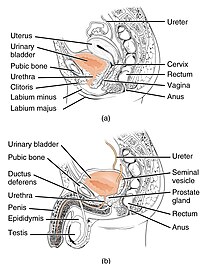
Photo from wikipedia
AIM To investigate the heterogeneous factors affecting the stability of patients older than 60 years in the UI treatment with Antimuscarinics. BACKGROUND The prevalence of Urge Incontinence (UI) in older… Click to show full abstract
AIM To investigate the heterogeneous factors affecting the stability of patients older than 60 years in the UI treatment with Antimuscarinics. BACKGROUND The prevalence of Urge Incontinence (UI) in older persons reaches 29.3%. The symptoms of urinary incontinence in older people reduce the health related life quality. MATERIALS AND METHODS In 1257 patients over 60 years (857 (68.2%) women - average age 67.8, 400 (31.8%) men - 71.4), who received AM for one year, demographic, socio-economic and health parameters were studied. OABq-SF questionnaires, MOS SF-36, urination diaries, uroflowmetry, income information from the tax offices and outpatient records were used. RESULT The compliance to AM treatment within 6 months was retained in 44.2%, and within the year - 26.8% of older patients. At least 40% of the total number of patients refused to continue the treatment for medical reasons. The persons taking Solifenacin (p≤ 0.01), Trospium (p≤ 0.05), or Darifenacin (p≤ 0.05), suffering from severe UI symptoms (p≤ 0.01), and experiencing minor side effects (p≤ 0.01), well-informed about UI treatment methods (p≤ 0.01) prevailed among the treatment compliant patients. At least 20.4% of the patients discontinued their treatment due to economic reasons. The persons with significantly larger annual income (p≤ 0.05) and annual medical cost (p≤ 0.01) prevailed among the treatment compliant patients. About 12.2% of the patients stopped their treatment for reasons related to the social background and psychological status. CONCLUSION In this experiment, we found that AM treatment compliance in older patients, in addition to medical parameters and health conditions, is largely affected by the economic as well as social, demographic and psychological factors. The study results can be claimed by practitioners involved in correcting UI symptoms in older people.
Journal Title: Current aging science
Year Published: 2017
Link to full text (if available)
Share on Social Media: Sign Up to like & get
recommendations!